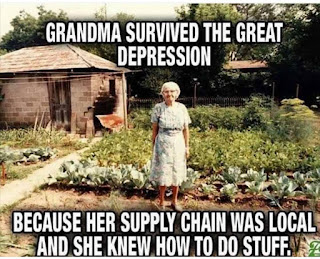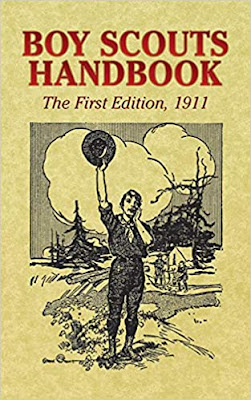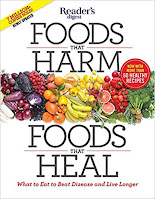By Tim Gamble
SHTF finally happened. The grid went down. The supply chain completely broke beyond repair. Chaos, violence, and death reign in the cities and suburbs as the survivors fight over the remaining scraps, as if in some sort of brutal reality TV show.
The good news is that your family have remained safe and well-fed, thanks to your wisdom in stockpiling lots of food and other supplies. But as the months have dragged on and on, things haven't returned to normal. The supply chain remains broken. The store shelves remain empty. And your larder, no matter how deep, is finally starting to run out. You are forced to ask the unthinkable: What happens when your food stockpile runs out?
No matter how much food, water, medicine, and other supplies we stockpile, our supplies will eventually run out if things don't return to normal fairly soon. And the way this world is going, we may not see normal return during our lifetimes. Maybe not even within our kids' lifetimes. What then?
Here is the dirty little secret of prepping: Stockpiling food and other stuff is only a short-term fix or, with great effort and expense, a medium-term fix at best. We can buy some time by stockpiling, but that is all we are doing - buying time. We are not solving the problem. Once the larder runs empty, the real problem will become obvious.
The real problem is that we have become dependent not on ourselves, our family, and our tribe, as it was for thousands of years, but on the modern worldly system for our sustenance.
Overseas manufacturing of basic goods, long international supply chains, just-in-time inventory systems, and lean manufacturing systems (aka just-in-time manufacturing), have replaced local economies and actual relationships. This has maximized profits for the Elites, but created a system far too fragile to handle any problems that may arise.
"Grandma survived the great depression because her supply chain was local and she knew how to do stuff."
We don't provide for ourselves or our families anymore, and haven't in decades. Instead we depend on the fragile worldly system to do that for us. Sure, most of us work for money, but then we trade that money for goods produced half-way around the world by people who hate us. Our supply chains are no longer local, and we no longer do stuff for ourselves, and most of us don't know how to do stuff anyway.
This leaves us vulnerable at every link of this worldly system. We need someone to employ us, which gives them power over us (take the jab or no job for you). The reality of our paycheck dwindles as inflation destroys its pretend value. We use that money to buy food to eat only if the shelves stay full, and only if they let us in (no mask, no entry, soon to be no vaccine passport, no entry). Store shelves remain full only as long as the trucks, and cargo ships, run.
Those ships and trucks need stuff to carry, which is produced mostly in far-away lands ruled by governments that don't like us (such as China). And those ships and trucks require fuel, which they don't want us to produce ourselves anymore (because "climate change"). So, we must beg people who don't like us (OPEC, Russia) to produce what we can but won't (apparently foreign oil doesn't cause climate change, or something...).
Are you starting to see why we are having supply chain problems and high inflation? Are you starting to understand that this situation is intentional? Are you starting to understand why it won't end anytime soon?
Self-Reliance and Local Economies built around Agrarian Communities.
The only real solution for our larders running out is a return to the old paths of self-reliance and local economies built around agrarian communities.
The time we have left before SHTF, and the time after SHTF that our food storage buys us needs to be spent preparing for what happens when the food stockpile runs out. This starts with self-reliance. Self-reliance means providing for ourselves and our families on an ongoing basis (buying food is a one-off - you eat it and its gone).
It means raising our own food - through gardening or raising livestock (chickens, goats, etc.), and through planting fruit and nut trees, and berry bushes. This may seem easy to country folks with a bit of land (but are you doing it yet, or are you waiting for your food stockpile to run out before you learn how?). But city folk and suburbanites can do it, too. You'll be surprised how much you can grow on a small plot of land, even if its less than a quarter acre! (See my articles on City Farming and on Small Plot Gardening.)
I recommend the books Mini Farming: Self-Sufficiency on 1/4 Acre and The Mini Farming Bible: The Complete Guide to Self-Sufficiency on ¼ Acre, both by Brett Markham.
It could also mean hunting, fishing, and foraging, but really this is only a supplement to your food production at best. Game will quickly become scarce once the grid goes down, like it did during the great depression. Besides, how many of us are actually good enough to provide 100% of our families food this way?
We also need to develop relationships with farmers in our areas. Learn where the local farms are in your area. Visit the local farmers' markets. Actually shake hands with a farmer and learn his name. This is the first step to building an agrarian community.
What is an agrarian community? Agrarianism is an economic and social philosophy which places primary importance on agriculture and related fields, and in rural living, as opposed to industrialized, urban living. I believe the agrarian lifestyle is much more conducive to living God's way rather than worldly ways. I also believe agrarianism is a healthier lifestyle, both physically and emotionally. Local economies built around agrarian communities is an absolute must for future survival.
This is also a Biblical concept. Here is something I wrote a few years ago:
"Agrarianism is God's intent for His people. Humans were originally designed by God to live in and tend to the Garden of Eden. Later, after the Fall, we were commanded by God to till the soil and to raise our own food. Throughout the Bible, there are numerous examples of God telling His followers to avoid large cities (a Worldly invention), to live in the mountains and other rural areas, and to basically be "simple country folk" (in my words).
Biblical agrarianism doesn't mean everyone must be a farmer or homesteader - after all, there are plenty of support functions that must be done - but that as God's people, our lives, culture, economy, and civilization should reflect the primary importance of agriculture." -- Tim Gamble, Precepts of Scriptural Survivalism
What Happens When the Food Stockpile Runs Out? We, as individuals, families, and communities, will have to provide for ourselves. How successful, or not, we will be at this is completely dependent on what we do between now and then.
------
I am aware of others using the term "Biblical Agrarianism." For the sake of clarity, I am not a part of that group and am not familiar with all their teachings. My use of that term is coincidental. Likewise, I am recently familiar with the "Militant Farmer" concept of Bear Independent. Check out his You Tube channel for more.
------
*** Liked this article? Never miss out on future articles by following Dystopian Survival.













